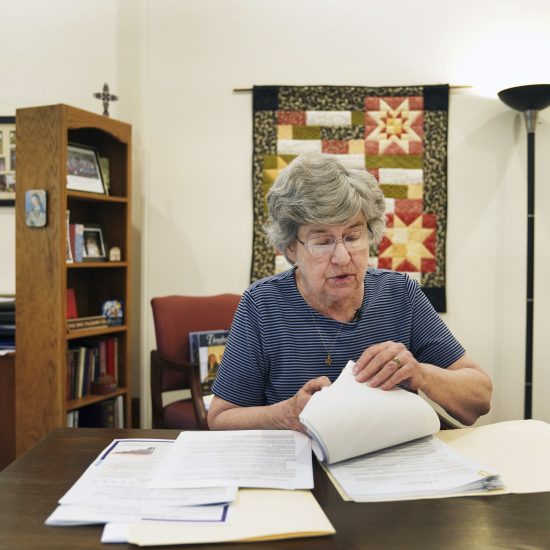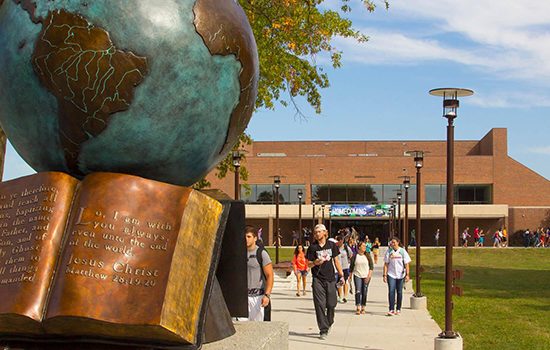Messengers will gather at First Baptist Church of Raytown on Oct. 26-28 and they’ll have a full agenda. Some of it will be celebratory and — if conversations around the state are any indication — parts may certainly be contentious. As such, it might be a typical Missouri Baptist Convention annual meeting. Here are a few things to expect.
The anniversary. The convention will celebrate its 175th anniversary since the founding of what was constituted back in 1834 as the Baptist Central Society of Missouri, later known as the General Association of United Baptists in Missouri, then the Missouri Baptist General Association and currently the Missouri Baptist Convention.
The installation. David Tolliver will be in the executive director’s seat for his third straight annual meeting, but this year he has shed the interim label. As such, he will be installed as the duly elected executive director in the opening session, when he will bring the executive director’s message. Naturally, this will be a solemn occasion, for the task is formidable, even on the best days.
Missions. The convention has a whole evening set aside for an update on the missions emphases of the convention, including various partnerships. Messengers will celebrate what has been accomplished and attempted during the past year or more and will anticipate proposed partnerships, including northern Illinois; northern Ontario, Canada; Africa’s western cluster, including Cape Verde, Senegal, Gambia, Guinea-Bissau, Guinea, Sierra Leone, Liberia and Mali; and an extension of the current partnership with El Salvador through 2012. Surely, every messenger and guest will be of one mind during this part of the meeting.
The Cooperative Program. The MBC Executive Board has prepared a test for messengers this year by calling for mission funds given through the Cooperative Program channel to be set aside for legal fees, primarily lawyer’s fees, in the MBC lawsuits against five institutions, including Missouri Baptist University, Missouri Baptist Foundation, The Baptist Home, Windermere Baptist Conference center and Word&Way.
The proposal calls for 3 percent of undesignated CP gifts to be placed in the Agency Relief Fund (ARF), which is designated for legal fees.
Initial reaction around the state when the Executive Board approved the budget with that provision was not particularly positive. Tolliver suggested the proposal would give messengers a chance to vote it up or down when the budget is presented. But later the Executive Board added an option — Plan B — to allow individual churches to opt out of having their CP gifts applied to legal fees. So the proposal in Raytown will be to approve a budget that gives churches an opt-out provision.
Many Missouri Baptists and their churches still feel the best approach is to vote down the budget because the end result of approving it is that the MBC will be spending Cooperative Program money on the lawsuits — now in their eighth year — after expending nearly $5 million already with nothing to show for the money and no end in sight. In other words, to vote for the budget — even with the two options — is to vote in favor of using CP funds for the litigation. This proposal has struck a nerve.
The budget may well pass in Raytown, but the matter promises to get a full discussion unless certain maneuvering takes place to cut it short. I suspect president Bruce McCoy will do his best to allow a full hearing of messenger concerns. And if it passes, look for a significant number of churches to decline to support it. For some, such plans already are in place.
The lawsuits. Regular attenders of annual meetings from across the state disagree on whether to continue the lawsuits. Some have run the numbers — both tallying the dollars spent and the years that have ensued — and they are ready to call it quits. Observers note that the zeal for continuing is powered primarily by the Executive Board at the urging of convention attorneys. Of course, a lot of Missouri Baptists are adamant to continue the legal action.
The legal task force, now known as the Agency Restoration Group (ARG), has painted a rosy picture each year since 2002 that victory over the five entities is just around the corner. Many are concluding that essentially repeating the same optimistic report and the same video clips year after year has grown thin. Leaders have begun to acknowledge that the convention has recovered nothing and, in fact, is without a significant victory in court proceedings in seven long years.
The only Cole County case that has gone to court — against Windermere — went the conference center’s way. And convention attorneys long ago exhausted their appeals without success. After the convention filed a suit in Camden County seeking title to Windermere’s property, a judge ruled in favor of the conference center and a string of other defendants that the MBC had lumped into its suit. The convention has appealed, and the court has yet to determine if it will hear the case because convention attorneys appear to have missed the legal deadline for filing the appeal in the first place.
In the meantime, the court in Camden County has declined to dismiss an amended counterclaim that seeks $15 million in actual damages from the convention and unspecified punitive damages.
The amended counterclaim was filed by Springfield developer William R. Jester, whose Windermere Development Company Inc. purchased 943 acres of land formerly owned by Windermere from National City Bank of the Midwest in November 2005. Windermere had transferred the land to the bank as part of a debt restructuring plan.
In its Camden County lawsuit, the convention sought to stop all land transactions at Windermere pending the outcome of legal action against the five institutions. The MBC also requested an injunction to prohibit Jester from financing and beginning construction on the property.
Jester’s counterclaim charges the convention with malicious prosecution, interfering with business and negligence. It charges the MBC of “engaging in a campaign of false, defamatory and otherwise improper communications with third parties” orally, through correspondence, by electronic mail and through the MBC’s news journal The Pathway, which caused companies and individuals to decline to do business with Jester’s firms.
The developer claims the interference has cost him more than $15 million in possible sales or development of the disputed property. Messengers will have no say in the disposition of Jester’s case but only in suits filed by the convention.
Those who believe the time has come to put the lawsuits behind the convention appear to have some support for their positions in high places.
Executive director Tolliver has gone on record as having opposed the filing of the original lawsuits based on his reading of 1 Corinthians 6:1-8, a position held by convention president and Executive Board chair McCoy.
Tolliver repeated his position in listening sessions around Missouri earlier this year. In a widely circulated e-mail, McCoy recently responded to a heads-up that some concerned messengers plan to make a motion in Raytown to drop the lawsuits.
McCoy responded: “Feel free to quote me early and often that I join them in the hopes of putting all this behind us. In my personal opinion, the Lord has not blessed our convention’s efforts to violate 1 Corinthians 6:1-8. So, to me, the sooner we humbly fall back into compliance with the Word of God, the sooner the Lord will restore His mighty Hand of blessing.”
It appears inconceivable that a motion to drop the suits will be declared out of order like it was a couple of annual meetings ago. Messengers were too quick back then to tolerate manipulation from the platform.
No one knows what will come out of any annual meeting, and that is certainly true of this one. But the rank-and-file seem a little restless this year, eager to at least make their voices heard on significant issues.
Bill Webb is editor of Word&Way.



